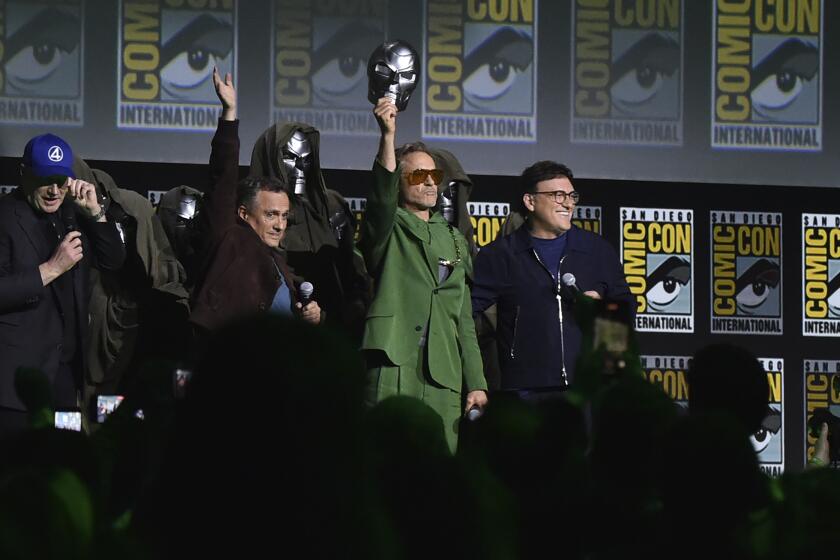‘Kingdom of Silence’ starkly explores Jamal Khashoggi’s life and murder, and the U.S. response
- Share via
Whether you believe Jamal Khashoggi, the Saudi journalist assassinated in Istanbul in 2018, to have been idealistic, naive or foolish, “Kingdom of Silence” is likely to spur a slew of emotions. A compelling profile not just of Khashoggi, but of the United States’ relationship with Saudi Arabia, the documentary charts a quixotic path, from young reporter to self-exiled critic of his homeland.
“Anybody that tells you that they know every aspect of Jamal’s life, they are 100% lying to you,” says human rights advocate Mohamed Soltan in a statement that becomes clearer as the film progresses. Watching “Kingdom of Silence,” you can only imagine the memoir Khashoggi might have written had he lived.
Colleagues and friends, including author (and executive producer) Lawrence Wright, characterize Khashoggi as a passionate romantic with big ideas, and the documentary echoes that sentiment, framing his writings (read by actor Nasser Faris) in near-heroic terms. In an ever-changing world, Khashoggi’s views evolved from an Islamist to a more liberal, secular perspective, but his patriotism never wavered.
As a foreign correspondent, he interviewed Osama bin Laden numerous times in Afghanistan and was surprised and disappointed when he turned to radicalism. After Sept. 11, 2001, Khashoggi disavowed Bin Laden and went to work directly for the Saudi government as a spokesman in 2003, an experience that granted him deep ties to the royal family but also left him conflicted about his country’s role in a shifting Arab world.
Khashoggi was energized by the Arab Spring of the early 2010s, but he found the oppressive government crackdowns and Saudi Arabia’s intervention in Yemen to be discouraging. As the kingdom entrenched deeper into being a theocratic monarchy and Crown Prince Mohammed bin Salman, popularly known as MBS, rose in influence, Khashoggi became more disenchanted.
Director Rick Rowley (“Dirty Wars”), a veteran Middle East observer, takes great pains to portray the enabling role the United States has played in Saudi Arabia. Decades before Donald Trump, numerous presidents, especially the Bushes, developed close ties with the Saudis, resulting in strong political and economic ties and bestowing a sense of impunity on the kingdom. Former U.S. officials John Brennan, Richard Clarke and Ben Rhodes provide insightful analysis to these dynamics and how they shaped the environment that led to Khashoggi’s death.
Khashoggi spent his final year in self-imposed exile as a contributing columnist for the Washington Post, spending time in D.C., London and Istanbul. In Turkey, he discovered a community of Saudis in exile. But it was also where he was killed, inside the Saudi consulate at the hands of Saudi Intelligence operatives, ordered by MBS, according to the CIA.
We are reminded of the United States’ response, a virtual shrug, as President Trump brashly admits he will do nothing to jeopardize billions of dollars in oil and arms deals with the Saudis. Longtime U.S. diplomat David Rundell practically chortles in praising the response, “Saudi Arabia is a strategic ally and I do think that outweighs the death of one person. Yes, it does.” It’s a jaw-dropping moment.
The killing of Khashoggi, strangled and dismembered, his remains never found, was such a shocking story that it astounds how quickly it settled under the dust of other news. “Kingdom of Silence,” debuting exactly two years later, is a disturbing jolt to our collective conscience — if we still have one.
‘Kingdom of Silence’
In English and Arabic with English subtitles
Rated: TV-MA
Running time: 1 hour, 38 minutes
Playing: 9 p.m. Oct. 2, Showtime
More to Read
Only good movies
Get the Indie Focus newsletter, Mark Olsen's weekly guide to the world of cinema.
You may occasionally receive promotional content from the Los Angeles Times.











